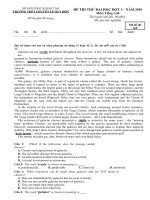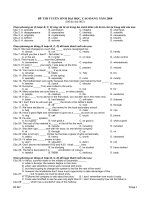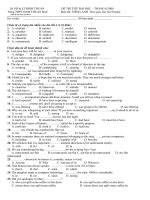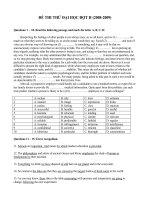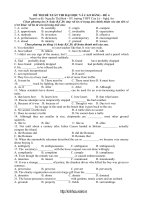Đề thi thử đại học môn tiếng anh 13
Bạn đang xem bản rút gọn của tài liệu. Xem và tải ngay bản đầy đủ của tài liệu tại đây (124.5 KB, 6 trang )
TRƯỜNG THPT CHUYÊN
NGUYỄN TẤT THÀNH
ĐỀ THI THỬ ĐẠI HỌC MÔN TIẾNG ANH
Năm học 2009-2010
Thời gian làm bài: 90 phút
Phonetics:
1. A. information B. decoration C. considerate D. confidential
2. A. ensure B. result C. museum D. follow
3. A. holiday B. monitor C. insurance D. instrument
4. A. sacrifice B. supportive C. compliment D. maintenance
5. A. biology B. historical C. security D. mechanism
Choose the best answer:
6. Fiction books tell stories from the author's _________
A. imagine B. imaginative C. imaginable D. imagination
7. It's a pity you did not go to my party. Otherwise, you _________ lots of fun.
A. had B. had had C. would have D. would have had
8. Can you tell me where _________ all morning?
A. you have been B. you were C. have you been D. were you
9. We regret to tell you that the materials you order are out of _________.
A. work B. stock D. reach D. practice
10.They intended to _________ with the old computers as soon as they could afford some new ones.
A. do away B. do up C. do over D. do down
11. ________ the end, the managers decided to stop the tower project as the prices had increased a lot.
A. In B. At C. On D. By
12. There's no _________ in waiting any longer so we left.
A. use B. point C. way D. good
13. _________ you do not have the key, you will have to come back before he leaves.
A. Although B. However C. Provided D. As
14. I have a bad toothache today. I _________ to the dentist yesterday when it started hurting.
A. should go B. should be C. should have gone D. should have been
15. I don't remember _________ the door when I left home this morning.
A. to lock B. locking C. lock D. having locked
16. I want to _________ this old car for a Ferrari but I don't have enough money now.
A. change B. exchange C. sell D. replace
17. If you _________ behaving like this, you will bring yourself nothing but trouble.
A. try on B. turn on C. insist on D. focus on
18. Last week, the professor promised that he _________ about the Internet 3.0 today.
A. told B. tells C. would tell D. is telling
19. I'm sure the answer to my letter _________ before next Friday evening.
A. will arrive B. will have arrived C. arrives D. is arriving
20. It's English phrasal verbs _________ puzzle learners most.
A. which B. that C. who D. Ф
21. "It's kind of you to help me tidy the room"
" _________"
A. Really B. You're welcome C. That's all right D. It doesn’t matter
22. The children can stay here _________ they keep things in order.
A. as long as B. in order to C. because D. although
1
23. All of us were _________ to hear that he was successful in his final exam.
A. surprising B. surprised C. surprisingly D. surprise
24. "Which of the two boys is a boy Scout?". " _________ of them is"
A. All B. None C. Neither D. Either
25. _________ all university students think that they can earn a lot right after graduation.
A. most B. almost C. mostly D. the most
26. Our school clubs gives students _________ pleasure after school time.
A. a great deal of B. a large number of C. a large quantity of D. a large deal of
27. Art critics do not agree on what _________ a painting great.
A. qualities to make B. qualities make C. are qualities to make D. do qualities make
28. The house still remains in _________ after the hurricane.
A. a good condition B. good condition C. good conditions D. the good condition
29. We are fighting _________ time to finish the job before weekend.
A. on B. in C. with D. against
30. This is _________ the most challenging task I have ever done.
A. by far B. by all means C. by the way D. by rights
31. Pete was born and brought up in Cornwall and he knows the place like the _________
A. nose on his face B. back of his hand C. hairs on his head D. tip of his tongue
32. His aunt bought him some books on astronomy and football, _________ he had any interest in.
A. neither of whom B. neither of which C. neither of what D. neither of them
33. "_________ ". "Not now but I used to"
A. Won't you have some tea? B. Do you watch TV very often?
C. Some more wine? D. Are you going to bed?
34. "Young people nowadays are ambitious."
A. You can say that again B. You are right
C. That's not it D. You bet
35. "You have a good voice!"
"_________"
A. I appreciate it B. Well-done C. Yes, of course D. You've done a good job
Read the following passage and mark the letter A, B, C or D on your answer sheet to indicate the
correct word for each of the blanks.
There are various type of pollution in the world. The most (36)_________ one is air pollution. it is
caused mostly by factories which discharge smoke. This smoke pollutes the atmosphere (37)_________
dust and cinder which can cause various types of diseases like lung cancer, heart failure and sinus infection.
(38)_________ inhaled, carbon monoxide from exhaust (39)_________ of vehicles is also very dangerous
and can cause instant death if people inhale in (40)_________ amount.
Water pollution is the pollution that occurs in the rivers, seas, oceans, lakes and other waterways.
Water pollution is normally caused by the (41)_________ of waste such as garbage and faeces. The marine
life in these waters will be affected. Some sea creatures perish while others (42)_________ the toxic
extracts of the poisonous wastes in their bodies. When human beings eat these creatures, they will (43)
_________ fall ill or die. In Japan alone, every year, thousand of people suffer (44)_________ strange
diseases due to mercury poisoning. Others lose their (45)_________ or meet their deaths.
36. A. widespread B. extensive C. intensive D. expanding
37. A. through B. in C. by D. with
38. A. after B. on C. when D. upon
39. A. tubes B. tracts C. pipes D. sprayers
40. A. tremendous B. unlimited C. exceeding D. excessive
41. A. throwing B. pouring C. dumping D. discarding
42. A. stock B. store C. hold D. contain
2
43. A. either B. both C. equally D. constantly
44. A. by B. from C. through D. with
45. A. aptitude B. competence C. ability D. capacity
Read the following passage and answer the questions:
Three scales of temperature, each of which permits a precise measurement, are in concurrent use: the
Fahrenheit, Celsius, and Kelvin scales. These three different temperature scales were each developed by
different people and have come to be used in different situations.
The scale that is most widely used by the general public in the United States is the Fahrenheit scale. In
1714, Daniel Gabriel Fahrenheit, a German physicist who was living in Holland and operating an
instrument business, developed a mercury-in-glass thermometer and the temperature scale that still carries
his name. His original scale had two fixed points: 0º was the lowest temperature that he could achieve in a
solution of ice, water, and salt, and 96º was what he believed was the normal temperature of the human
body (though this was later determined to be 98.6º). Based on this scale, he calculated that the freezing
point (or ice point) of water was 32º; in later studies, it was determined that the boiling point of water (the
steam point) was 212º. The Fahrenheit scale came to be accepted as the standard measure of temperature in
a number of countries, including Great Britain, and from there it was spread to British colonies throughout
the world. Today, however, the United States is the only major country in the world that still uses the
Fahrenheit scale.
The scale that is in use in many other countries is the Celsius scale. Anders Celsius (1701–1744), a
Swedish astronomer, developed a thermometer in 1741 that based temperatures on the freezing and boiling
temperatures of water. On the thermometer that Celsius developed, however, 0º was used to indicate the
boiling temperature of water, and 100º was used to indicate the freezing temperature of water. After his
death, the scale was reversed by a friend, the biologist Carl von Linne (1707–1748), who achieved acclaim
for his development of the Linnean's classification system for plants and animals. On the new scale after the
reversal by von Linne, 0º indicated the freezing temperature of water, and 100º indicated the boiling
temperature of water. At around the same time that Celsius and von Linne were working on their
thermometer in Sweden, a similar thermometer was being developed in France. After the French
Revolution, the scale developed in France was adopted as part of the metric system in that country under
the name centigrade, which means "a hundred units," and from there it spread worldwide. In 1948, an
international agreement was made to rename the centigrade scale the Celsius scale in honor of the
scientist who was first known to use a 100-degree scale, though it should be remembered that the scale
that Celsius actually used himself was the reverse of today's scale.
A third scale, the Kelvin scale, is generally used today for scientific purposes. This scale was first
suggested in 1854 by two English physicists: William Thomson, Lord Kelvin (1824–1907) and James
Prescott Joule (1818–1889). The Kelvin scale defines 0º as absolute zero, the hypothetical temperature at
which all atomic and molecular motion theoretically stops, and 100º separates the freezing point and boiling
point of water, just as it does on the Celsius scale. On the Kelvin scale, with 0º equal to absolute zero, water
freezes at 273º, and water boils at a temperature 100º higher. The Kelvin scale is well suited to some areas
of scientific study because it does not have any negative values, yet it still maintains the 100º difference
between the freezing point and boiling point of water that the Celsius scale has and can thus easily be
converted to the Celsius scale by merely subtracting 273º from the temperature on the Kelvin scale.
46. The word fixed in paragraph 2 could best be replaced by
A. ordered B. repaired C. established D. attached
47. What is stated in the passage about the temperature scale developed by Fahrenheit?
A. On it, 0º was the freezing point of water.
B. It was based on the lowest and highest temperatures that he could achieve with a mixture of salt and
water.
C. On it, 100º was the boiling point of water.
D. It was based on an inaccurate understanding of the normal temperature of the human body
3
48. The author refers to many other countries in paragraph 3 in order to
A. introduce a discussion of the areas of the world where the Celsius scale is used
B. argue for the need for a standard measure of temperature throughout the world
C. provide an example that demonstrates the effectiveness of the Celsius scale
D. relate the widespread use of the Celsius scale to the previously mentioned limited use of the
Fahrenheit scale
49. Which of the following is NOT true about the Celsius scale, according to the passage?
A. It was developed by an astronomer from Sweden.
B. It came into use in the eighteenth century.
C. One hundred degrees separated the freezing and boiling temperatures of water on it.
D. On it, 0º indicated the temperature at which water freezes.
50. The word reversed in paragraph 3 is closest in meaning to
A. brought in B. turned around C. thought up D. sent back
51. The word adopted in paragraph 3 could best be replaced by
A. taken on B. brought up C. looked upon D. turned down
52. Which of the sentences below expresses the information in the italic sentence in paragraph 3?
A. The discovery of the centigrade scale in 1948 brought honor to the scientist who discovered it.
B. After an international organization decided to use the centigrade scale in 1948, Celsius reversed the
numbers on the scale.
C. In 1948, nations agreed to name the centigrade scale after the man who developed an earlier version
of the scale.
D. In 1948, Celsius honored the scientist who was first known to use a 100-degree scale by naming it
the centigrade scale.
53. A hypothetical temperature in paragraph 4 is one that
A. is assumed to exist B. has been found to be false
C. is known to be impossible D. has been proved through experiments
54. The phrase well suited to in paragraph 4 could best be replaced by
A. appropriate for B. outfitted with C. related to D. in harmony with
55. It can be inferred from the passage that a temperature of 50º centigrade would be equal to
A. 223º on the Kelvin scale B. 273º on the Kelvin scale
C. 323º on the Kelvin scale D. 373º on the Kelvin scale
Read the following passage and answer the questions:
Since the world became industrialized, the number of animal species that have either become extinct
or have neared extinction has increased. Bengal tigers, for instance, which once roamed the jungles in vast
numbers, now number only about 2,300. By the year 2025, it is estimated that they will become extinct.
What is alarming about the case of the Bengal tiger is that this extinction will have been caused almost
entirely by poachers who, according to some sources, are not always interested in material gain but in
personal gratification. This is an example of the callousness that is contributing to the problem of
extinction. Animals such as the Bengal tiger, as well as other endangered species, are valuable parts of the
world’s ecosystem. International laws protecting these animals must be enacted to ensure their survival –
and the survival of our planet.
Countries around the world have begun to deal with the problem in various ways. Some countries, in
an effort to circumvent the problem, have allocated large amounts of land to animals reserves. They then
charge admission prices to help defray the costs of maintaining the parks, and they often must also depend
on world organizations for support. This money enables them to invest in equipment and patrols to protect
the animals. Another response to the increase in animal extinction is an international boycott of products
made from endangered species. This has had some effect, but by itself it will not prevent animals from
being hunted and killed.
4
51: What is the main topic of the passage?
A. Endangered species B. International boycotts
C. Problems with industrialization D. The Bengal tiger
52: The word “poachers” could be best replaced by which of the following?
A. Trained hunters B. Concerned scientists
C. Illegal hunters D. Enterprising researchers
53: The word “callousness” could be best replaced by which of the following?
A. independence B. insensitivity C. indirectness D. incompetence
54: The previous passage is divided into two paragraphs in order to contrast:
A. A statement and an illustration B. A problem and a solution
C. A comparison and a contrast D. Specific and general information
55: What does the word “this” refer to in the passage?
A. Bengal tiger B. Killing animals for personal satisfaction
C. The decrease in the Bengal tiger population D. Interest in material gain
56: Where in the passage does the author discuss a cause of extinction?
A. Lines 7-9 B. Lines 1-3 C. Lines 4-6 D. Lines 10-16
57: Which of the following could best replace the word “allocated”?
A. combined B. taken C. set aside D. organized
58: The word “defray” is closest in meaning to which of the following?
A. raise B. make a payment on C. lower D. make an investment toward
59: What does the term “international boycott” refer to?
A. Defraying the cost of maintaining national parks B. A global increase in animal survival
C. Buying and selling of animal products overseas D. A refusal to buy animal products worldwide
60: Which of the following best describes the author’s attitude?
A. concerned B. indifferent C. surprised D. forgiving
Mark the letter A, B, C, or D on your answer sheet to show the underlined part that needs correction.
66. A paragraph is a portion of a text consists of some sentences related to the same idea.
67. The measurement unit known as a "foot" has originally based on the size of the human foot.
68. She achieved world famous through her studies of child-rearing, personality and culture.
69. Some plants in this garden require very little sunlight but this one needs much more sunlight than
others.
70. Many animals have become extinction due to the interference of human beings.
Mark the letter A, B, C, or D on your answer sheet to indicate the sentence that is closest in meaning
to each of the following questions.
71. The builders are going to mend my roof tomorrow.
A. I am going to have my roof mended by the builders tomorrow.
B. I am going to have the builders to build my roof tomorrow.
C. I am going to have the builders mended my roof tomorrow
D. I am going to mend my roof with the builders tomorrow.
72. "Where is the book I lent you?" Dave asked
A. Dave asked if he lent me the book.
B. Dave asked where was the book he had lent me.
C. Dave asked where was the book he lent me.
D. Dave asked me where the book he had lent me was.
5
